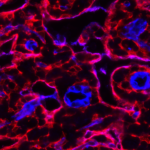Link to Pubmed [PMID] – 19601830
Curr. Pharm. Des. 2009;15(20):2282-7
ADAM (a disintegrin and metalloproteinase) proteins have a predominant role in the protein ectodomain shedding of membrane-bound molecules. ADAMs have emerged as critical regulators of cell-cell signaling during development and homeostasis, and are believed to contribute to pathologies, such as cancer, where their regulation is altered. ADAM9 is consistently overexpressed in various human cancers, and plays a role in tumorigenesis in mouse models. ADAM9 cleaves and releases a number of molecules with important roles in tumorigenesis and angiogenesis, such as EGF, FGFR2iiib, Tie-2, Flk-1, EphB4, CD40, VCAM-1, and VE-cadherin, and could represent a potential therapeutic target in tumors where it is highly expressed. This review provides an overview of ADAM9 with a major focus on its contribution to tumorigenesis. Its role in the shedding of cell surface molecules will be discussed along with emerging aspects of regulation and possible functions in cancer development.


